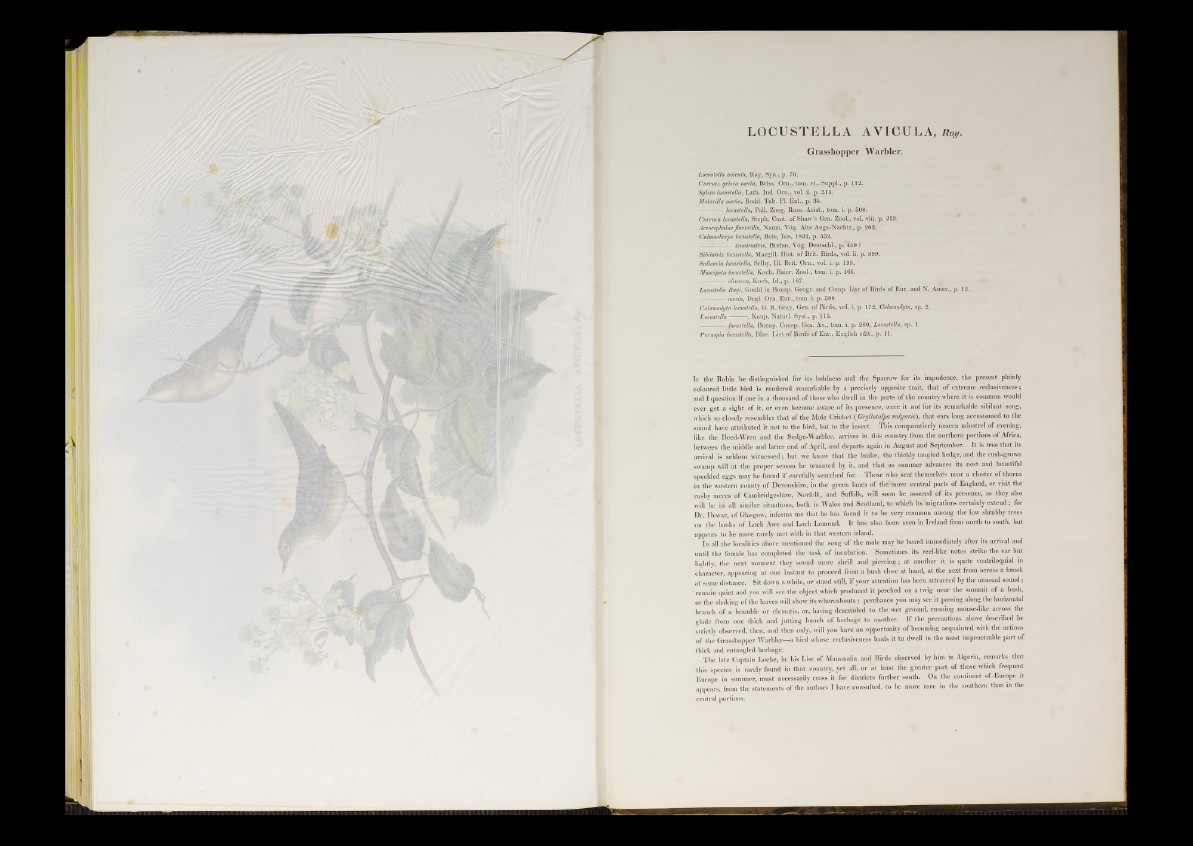
mK f
¡1 |i
LOCUSTELLA AYICULA, Ray.
Grasshopper Warbler.
Locustella avicula, Ray, Syn., p. 70.
Curruca grisea navia, Briss. Orn., tom. vi., Suppl., p. 112.
Sylvia locustella, Lath. Ind. Orn., vol. ii. p. 515.
Motacilla navia, Bodd. Tab. PI. Enl., p. 35.
— locustella, Pall. Zoog. Ross.-Asiat., tom. i.'p. 508.
Curruca locustella, Steph. Cont. of Shaw’s Gen. Zool., vol. viii. p. 213.
Acrocephalus Jlmiatilis, Naum. Vbg. Alte Augs-Nadhtr., p. 202.
Calamoherpe locustella, Boie, Isis, 1822, p. 552.
— tenuirostris, Brehm, Yog. Deutschl., p. 440 ?
Sibilatrw locustella, Macgill. Hist, of Brit. Birds, vol. ii. p. 399.
Salicaria locustella, Selby, 111. Brit. Orn., vol. i. p. 199.
Muscipeta locustella, Koch, Baier. Zool., tom. i. p. 166.
olivacea, Koch, Id., p. 167.
Locustella Rayi, Gould in Bonap. Geogr. and Gomp. List of Birds of Eur. and N. Amer., p. 12.
navia, Degl. Orn. Eur., tom. i. p. 589.
Calamodyta locustella, G. R. Gray, Gen. of Birds, vol. i. p. 172, Calamodyta, sp. 2.
Locustella , Kaup, Natiirl. Syst., p. 115.
locustella, Bonap. Consp. Gen. Av., tom. i. p. 280, Locustella, sp. 1.
Pamopia locustella, Bias. List of Birds of Eur., English edit., p. 11.
If the Robin be distinguished for its boldness and the Sparrow for its impudence, the present plainly
coloured little bird is rendered remarkable by a precisely opposite trait, that of extreme reclusiveness;
and I question if one in a thousand of those who dwell in the parts of the country where it is common would
ever get a sight of it, or even become aware of its presence, were it not for its remarkable sibilant song,
which so closely resembles that of the Mole Cricket ( Grijllotalpa vulgaris'), that ears long accustomed to the
sound have attributed it not to the bird, but to the insect. This comparatively unseen minstrel of evening,
like the Reed-Wren and the Sedge-Warbler, arrives in this country from the northern portions of Africa,
between the middle and latter end of April, and departs again in August and September. It is true that its
arrival is seldom witnessed; but we know that the brake, the thickly tangled hedge, and the rush-grown
swamp will at the proper season be tenanted by it, and that as summer advances its nest and beautiful
speckled eggs may be found if carefully searched for. Those who seat themselves near a cluster of thorns
in the western county of Devonshire, in the green lanes of the more central parts of England, or visit the
rushy meres of Cambridgeshire, Norfolk, and Suffolk, will soon be assured of its presence, as they also
will be iiS all similar situations, both in Wales and Scotland, to which its migrations certainly extend; for
Dr. Dewar, of Glasgow, informs me that he has found it to be very common among the low shrubby trees
on the banks of Loch Awe and Loch Lomond. It has also been seen in Ireland from north to south, but
appears to be more rarely met with in that western island.
In all the localities above mentioned the song of the male may be heard immediately after its arrival and
until the female has completed the task of incubation. Sometimes its reel-like notes strike the ear but
lightly, the next moment they sound more shrill and piercing; at another it is quite ventriloquial in
character, appearing at oue instant to proceed from a bush close at hand, at the next from across a brook
a t some distance. Sit down a while, or stand still, if your attention has been attracted by the unusual sound ;
remain quiet and you will see the object which produced it perched on a twig near the summit of a bush,
or the shaking of the leaves will show its whereabouts; perchance you may see it passing along the horizontal
branch of a bramble or clematis, or, having descended to the wet ground, running mouse-like across the
glade from one thick and jutting bunch of herbage to another. If the precautions above described be
strictly observed, then, and then only, will you have an opportunity of becoming acquainted with the actions
of the Grasshopper Warbler—a bird whose reclusiveness leads it to dwell iu the most impenetrable part of
thick and entangled herbage.
The late Captain Loche, in -his List of Mammalia and Birds observed by him in Algeria, remarks that
this species is rarely found in that country, yet all, .or at least tile greater part of those which frequent
Europe in summer, must necessarily cross it for districts further south. On the continent of.Europe it
appeal's, from the statements of the authors I have consulted, to be more rare in the southern than in the
central portions.